Your guide to photography locations in Lisbon – Lisboa.
Portugal’s vibrant capital is famous for its winding cobblestone streets and seven hills that feature a blanket of terracotta rooftops. You can keep yourself busy exploring Lisbon photography locations for weeks, hopefully this guide helps to narrow down where to go first!
While it’s the largest city in Portugal, the historic centre is still small enough to be walkable. Its narrow streets of the old neighbourhoods will let you discover unexpected details, cosy cafés and photo-worthy subjects wherever you go and send you back through time-machine more often than not.
The multitude of miradouros (viewpoints) are like a second personality of Lisbon. Here you will get the big picture, spectacular vistas, atmospheres and feel spaciousness. Then there is a modern part of town: the Parque das Nações – Park of Nations, the showground of the world exhibition Expo 98.
The capital can get crowded with tourists, especially around summer. I recommend starting your days very early to roam around more peacefully, take a substantial Mediterranean lifestyle break somewhere around lunchtime/ afternoon and recharge to venture out and experience beautiful lively evenings.
Public transport passes are a convenient addition for hill-tired legs and the experience of some iconic means of transportation. There are a few day trip options available only a train ride away from Lisbon: Cascais, Sintra and – most importantly – the Sintra-Cascais Natural Park, that have been added as a Bonus at the end of this guide.
This guide is written by Julie Baaske, a contributor to The Wandering Lens who has spent a great deal of time exploring and photographing Portugal with her camera, and watercolour brushes (she’s such a talented artist!).
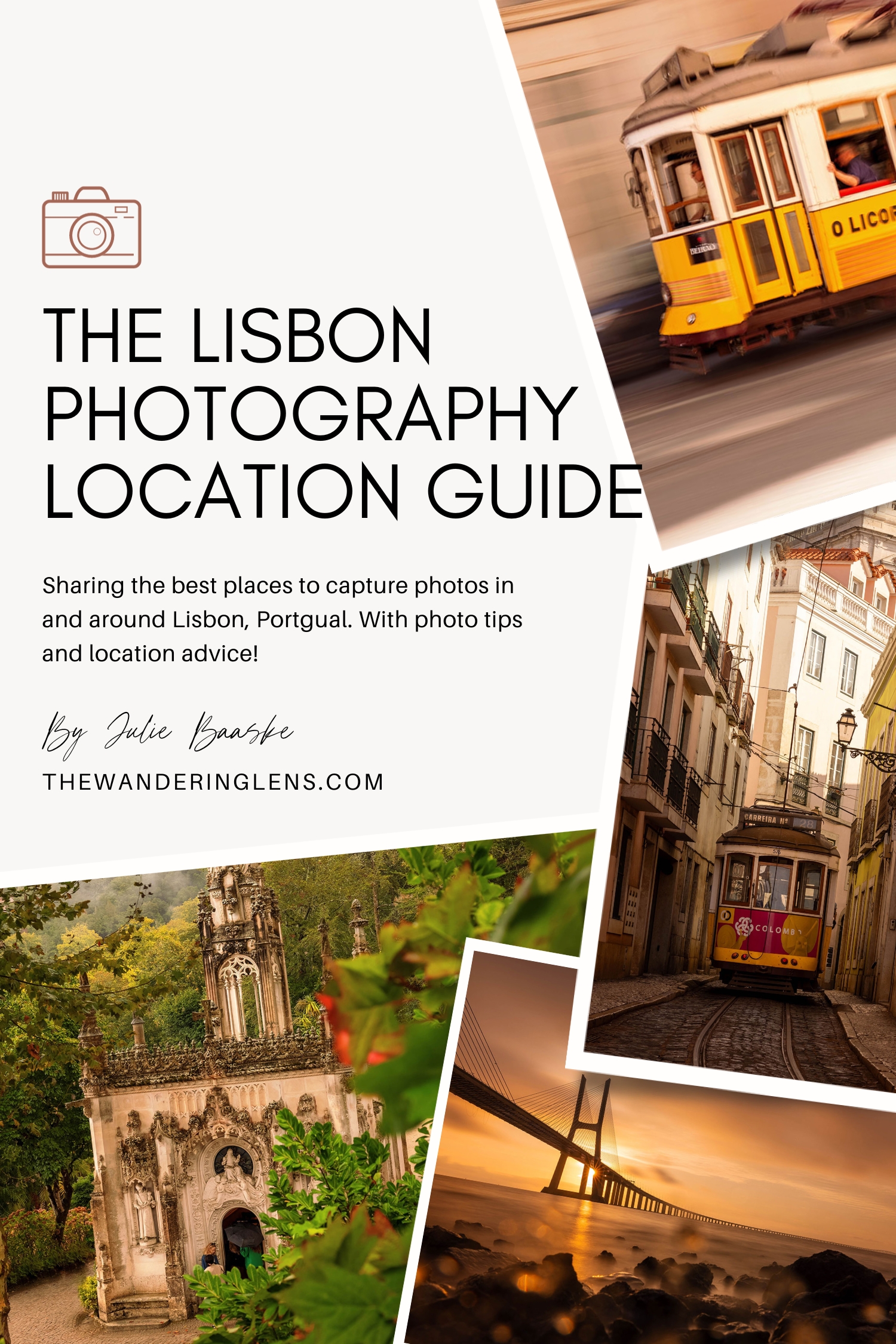
Lisbon Photography Locations –
#1 Eléctrico – The Electric Tram
Lisbon has a very special public transport system that is as frustratingly outdated as it is iconic and beautiful. The “eléctrico” can be found in Lisbon, Sintra and Porto. The most known tramline in Lisbon, the number 28, is painstakingly packed with tourists except for their first runs early in the mornings. If you want to ride an old eléctrico, I recommend trying any other line instead (also grab a daily public transport pass as it is covered by that).
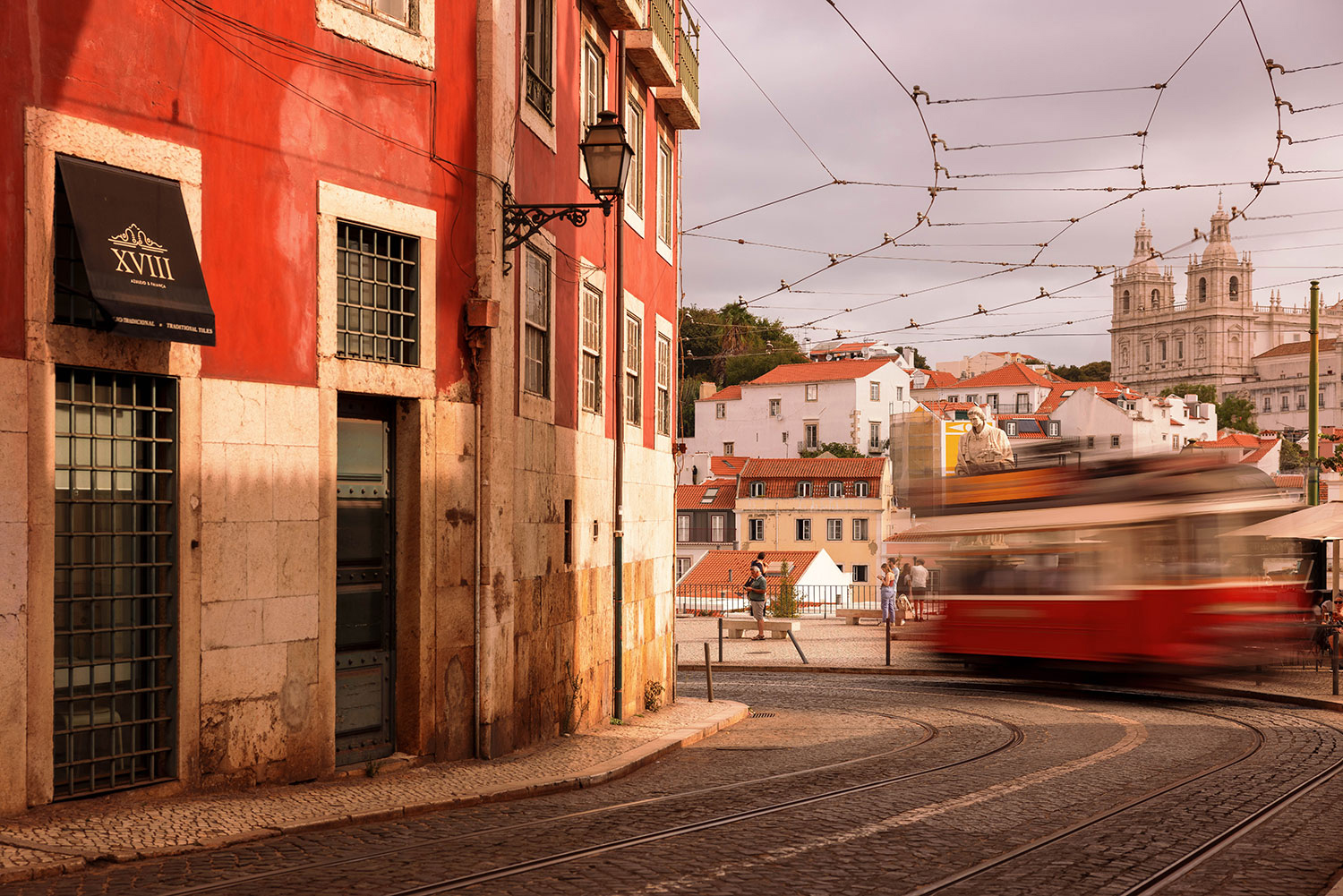
But as line 28 covers the most popular destinations in Lisbon, it is one of the best options to photograph the exterior of the tram with some of the best backgrounds. Just follow its tracks while walking through town, and you will get the best tour guide for about 10 km through the most known neighbourhoods for free. My favourite spots to photograph the tram are:
– Praça do Comércio (see 3.)
– in Alfama’s colourful and hilly streets (for example at Lisbon’s Sé Cathedral)
– in Graça, where it passes beautifully through very narrow streets.
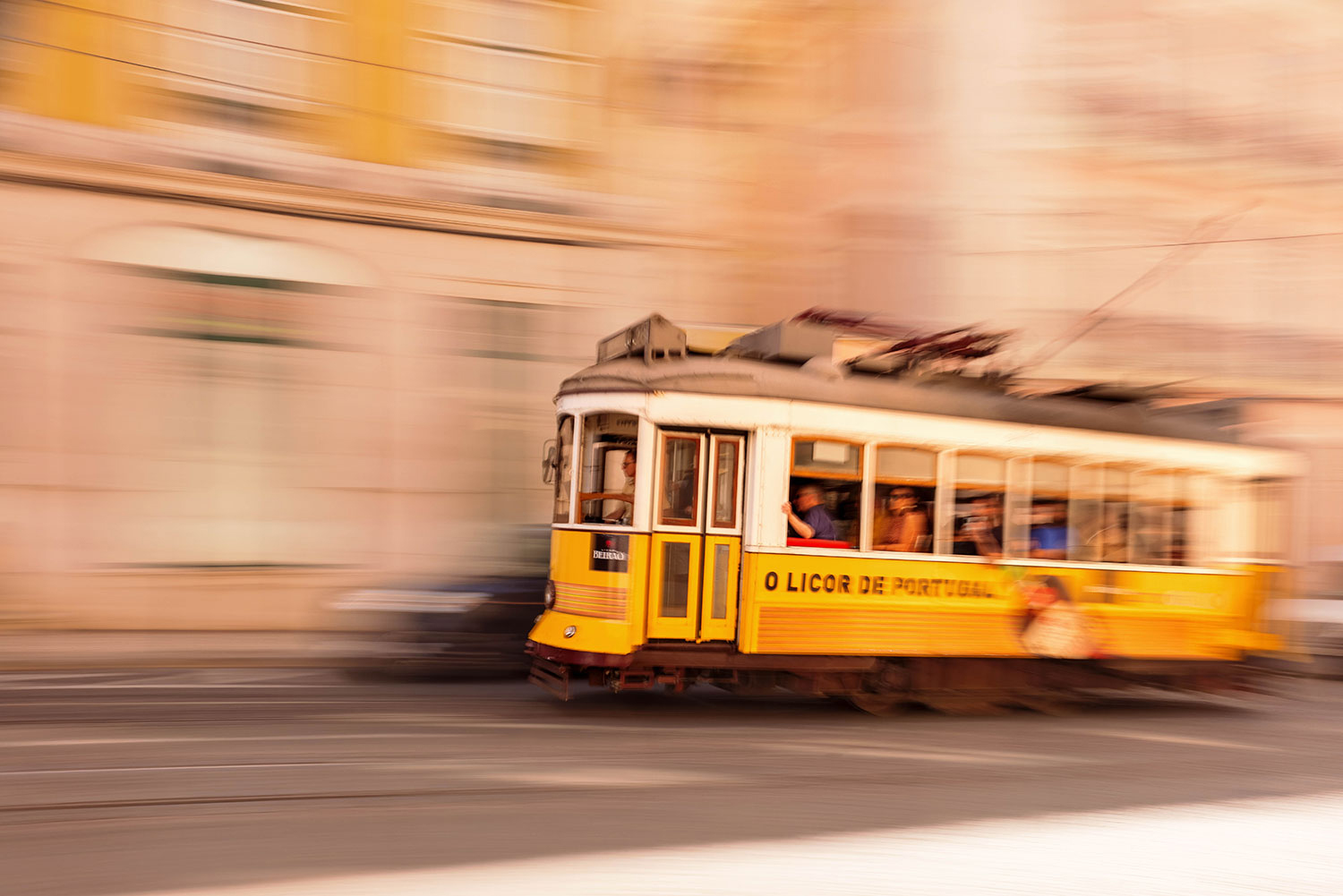
#2 Elevador da Bica – Bica Funicular
Besides the “eléctrico” there are two more rarities of public transportation in the capital. The Santa Luzia elevator and the Funiculars are catering for the third dimension of Lisbon’s seven hills. The most photogenic, in my opinion, is the Bica Funicular. It starts its service around 7am in the morning. Get up early if you want to avoid of people in your images as it gets very busy with tourists during the day.
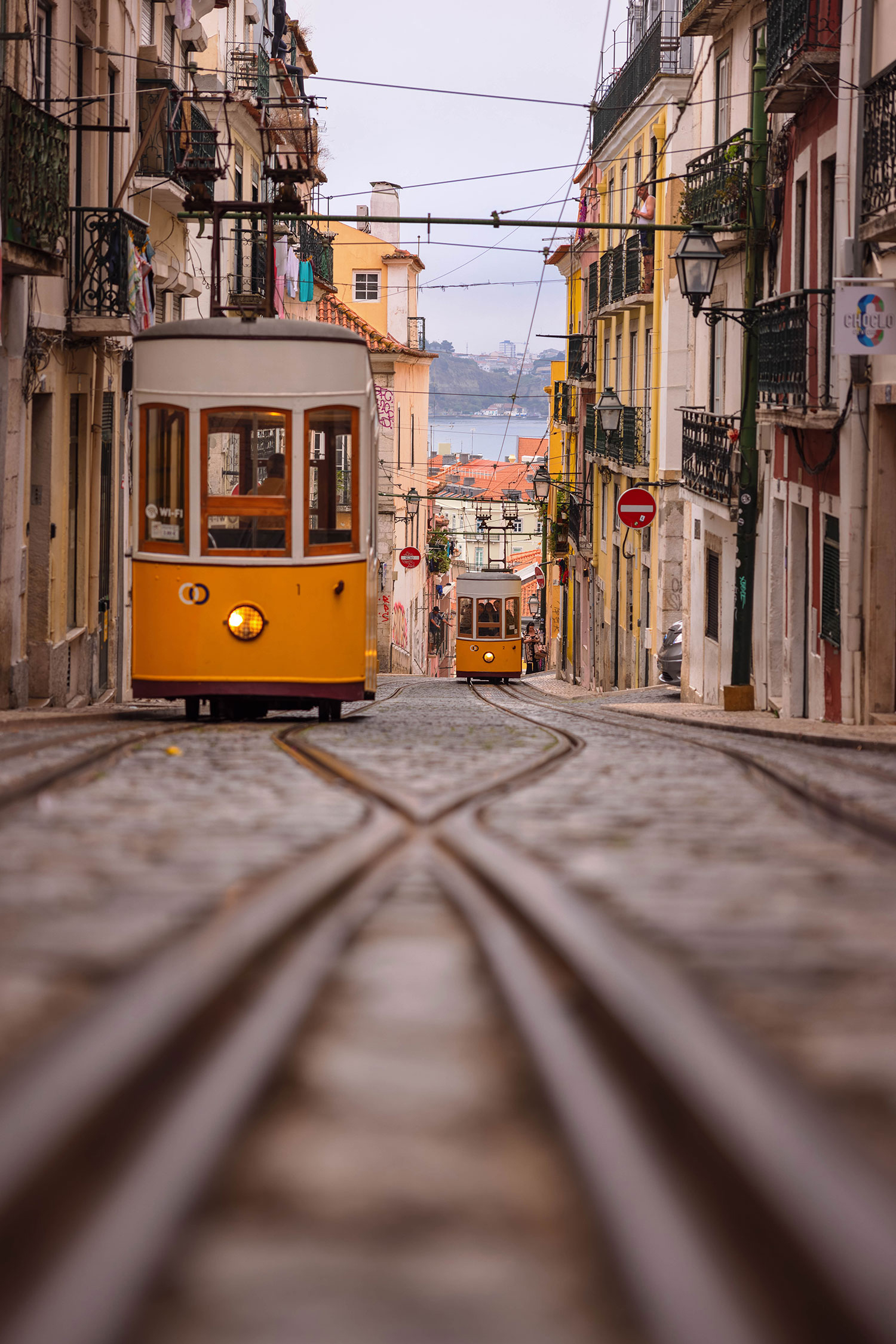
#3 Praça do Comércio/ Arco da Rua Augusta
The most iconic and central square of Lisbon offers some great photography opportunities. It is surrounded by buildings with beautiful archways on three sides and an open view onto the Tagus river on the other.
The most prominent feature of the square is Arco da Rua Augusta, one of the Lisbon photography locations you shouldn’t miss. It is an impressive sight from all angles and you can buy a ticket to go up onto the arch, enjoy the views and kiss some gigantic feet. The wonderful old trams, the eléctrico, are passing through the square as well and there are not many options in Lisbon that are as spacious as here to photograph it without too much other obstructive elements in between.
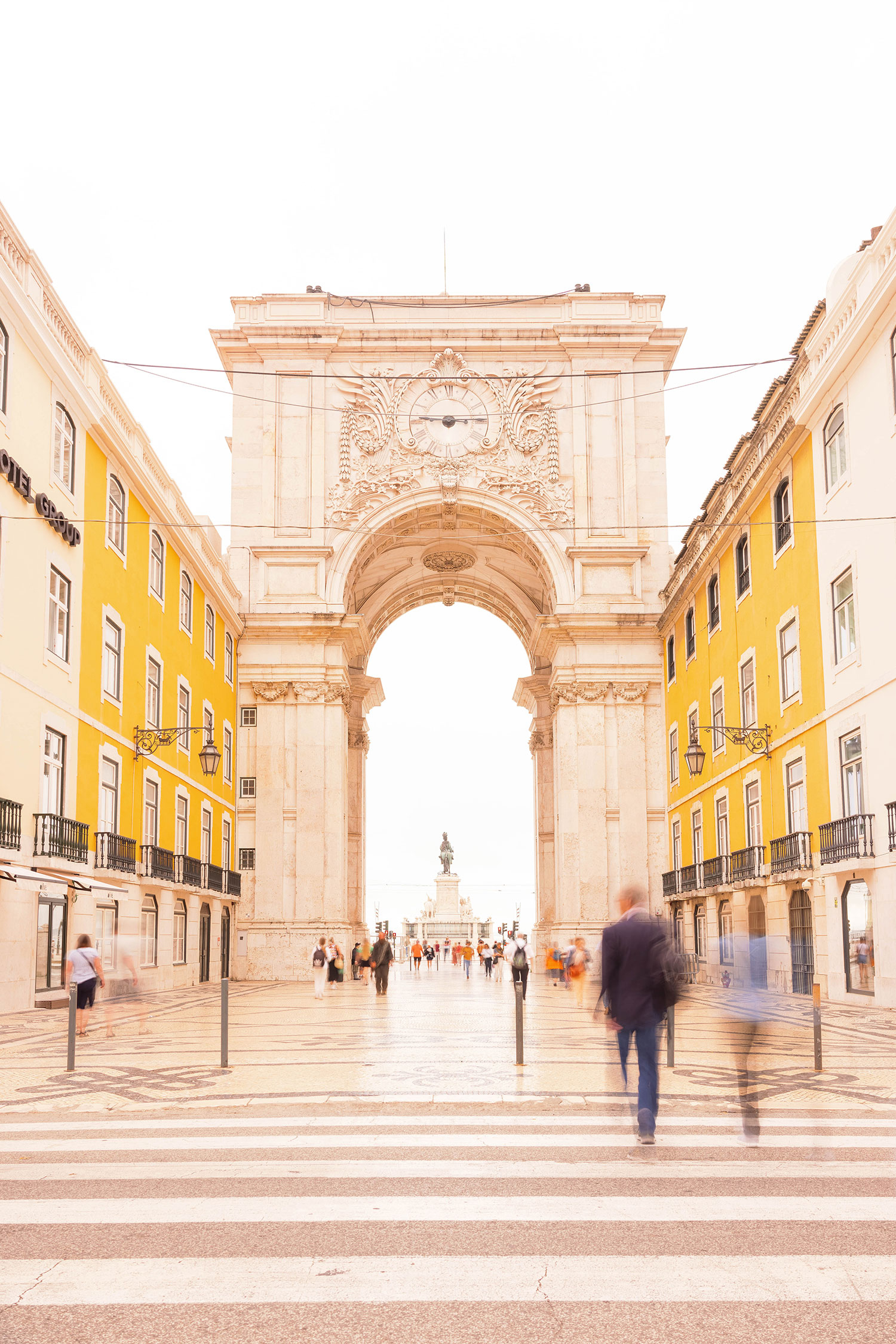
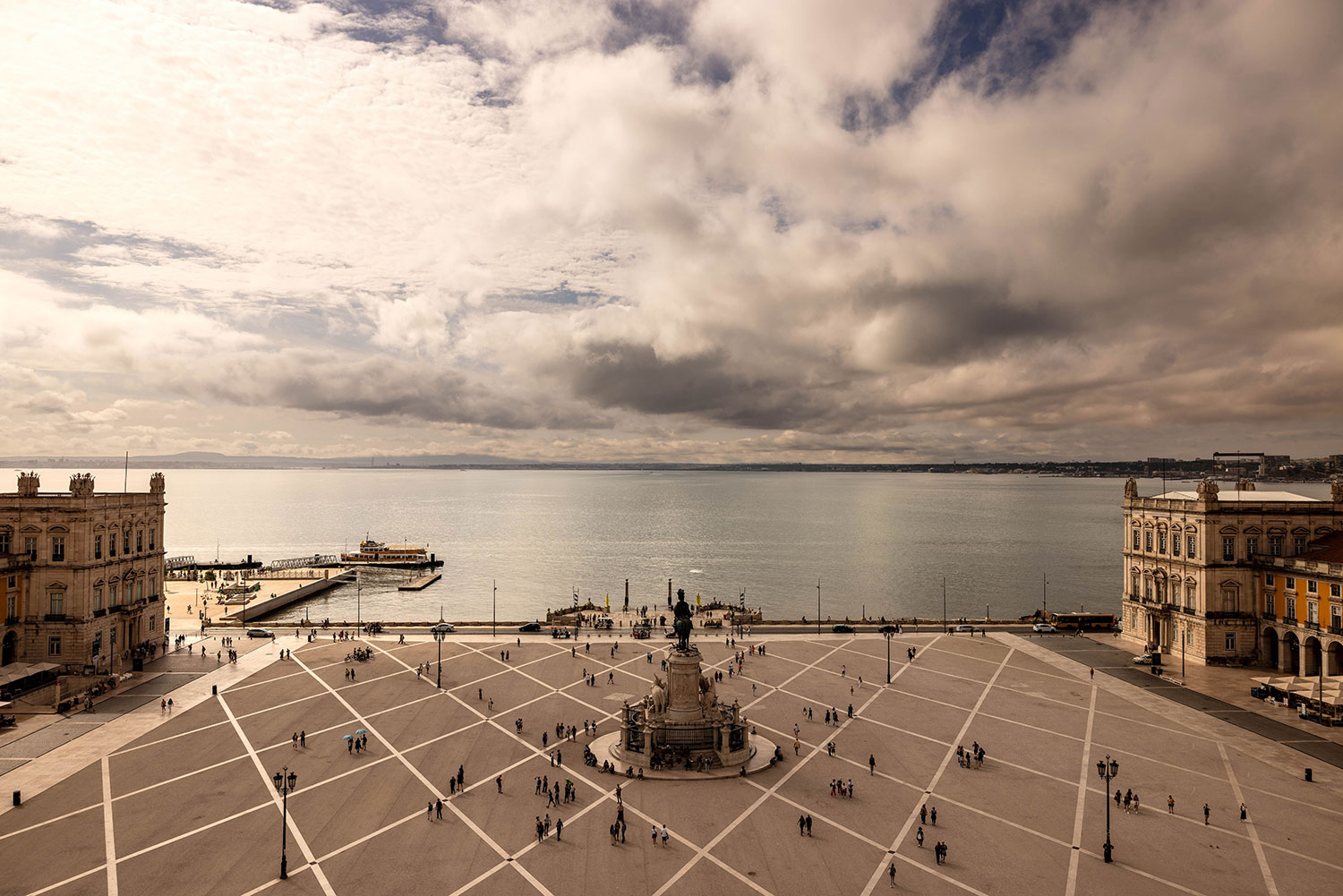
#4 Miradouro Portas do Sol/ Santa Luzia – Portas do Sol / Santa Luzia Viewpoint
Due to its hilly nature, Lisbon is famous for its numerous public viewpoints or terraces – the miradouros. If you’re keen to capture the skyline and an aerial perspective, this is a trio of Lisbon photography locations you have to add to your itinerary. Each one of them offers different great views of the seven hills of Lisbon. They also serve as lively hang-outs, especially in the evenings, to marvel at sunsets and share drinks that you will get at little kiosk or bar huts.
I chose to include more details about the Miradouro Portas do Sol and Miradouro Santa Luzia for this guide as they are only some meters apart, and offer great views.
The Miradouro Santa Luzia, with its white and blue tiles, is the most beautiful one of the Lisbon viewpoints in my opinion. But it is never uncrowded, no matter which time of the day. I tried it long before blue hour in the morning, only to find photographers with their clients, waiting for the first faint light of the day as well.
Miradouro Portas do Sol is just around the corner, more spacious and with better views in my opinion.
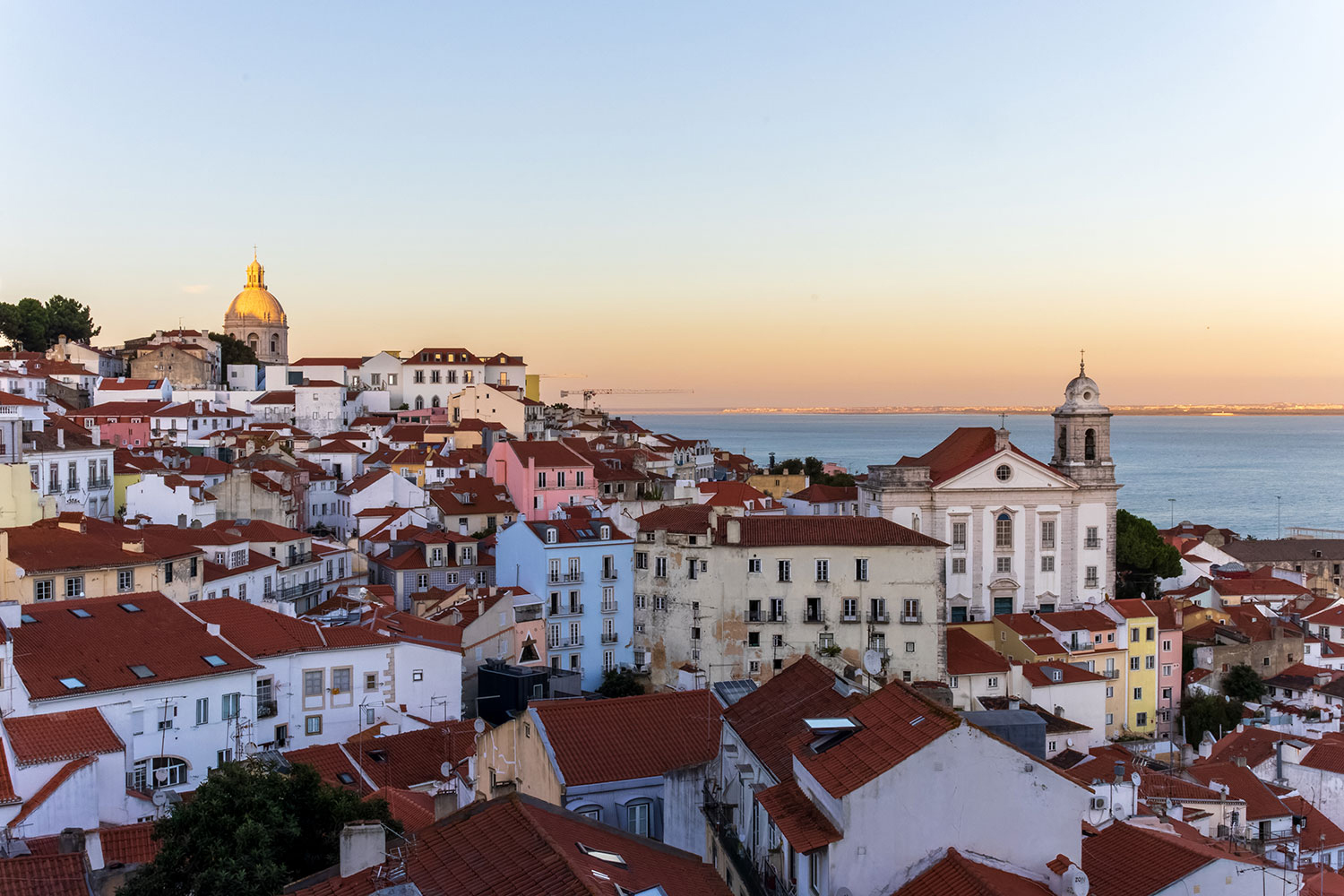
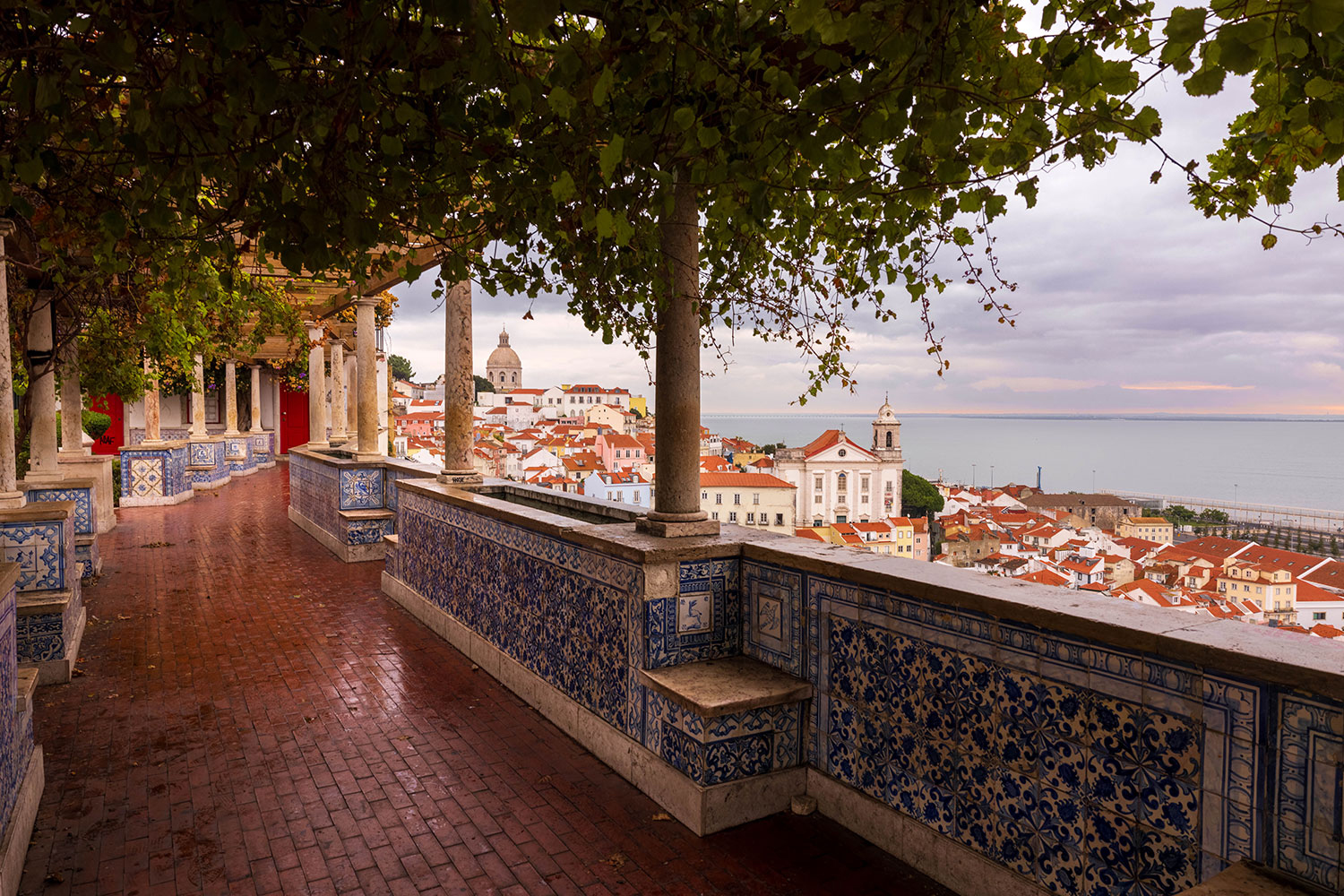
#5 Estácao do Oriente – Oriente train station
Let’s leave the old, historic part of town for a bit and focus on some striking modern architecture for a change. Let’s go to Parque das Nações – Park of Nations, the showground of the world exhibition Expo 98.
One exceptional and iconic building in this area opened its doors just in time for the exhibition in May 1998 to welcome its visitors arriving with public transport: Lisbon Oriente Station is one of the main Portuguese transport hubs interconnecting the Lisbon Metro, national and international buses, regional and high-speed trains.
It was designed by Spanish architect Santiago Calatrava and offers a lot of different visual aspects and perspectives for your photography. Bring your ND filters again, if you want to eliminate fully sharp people from your imagery or catch the movement of the passing trains.
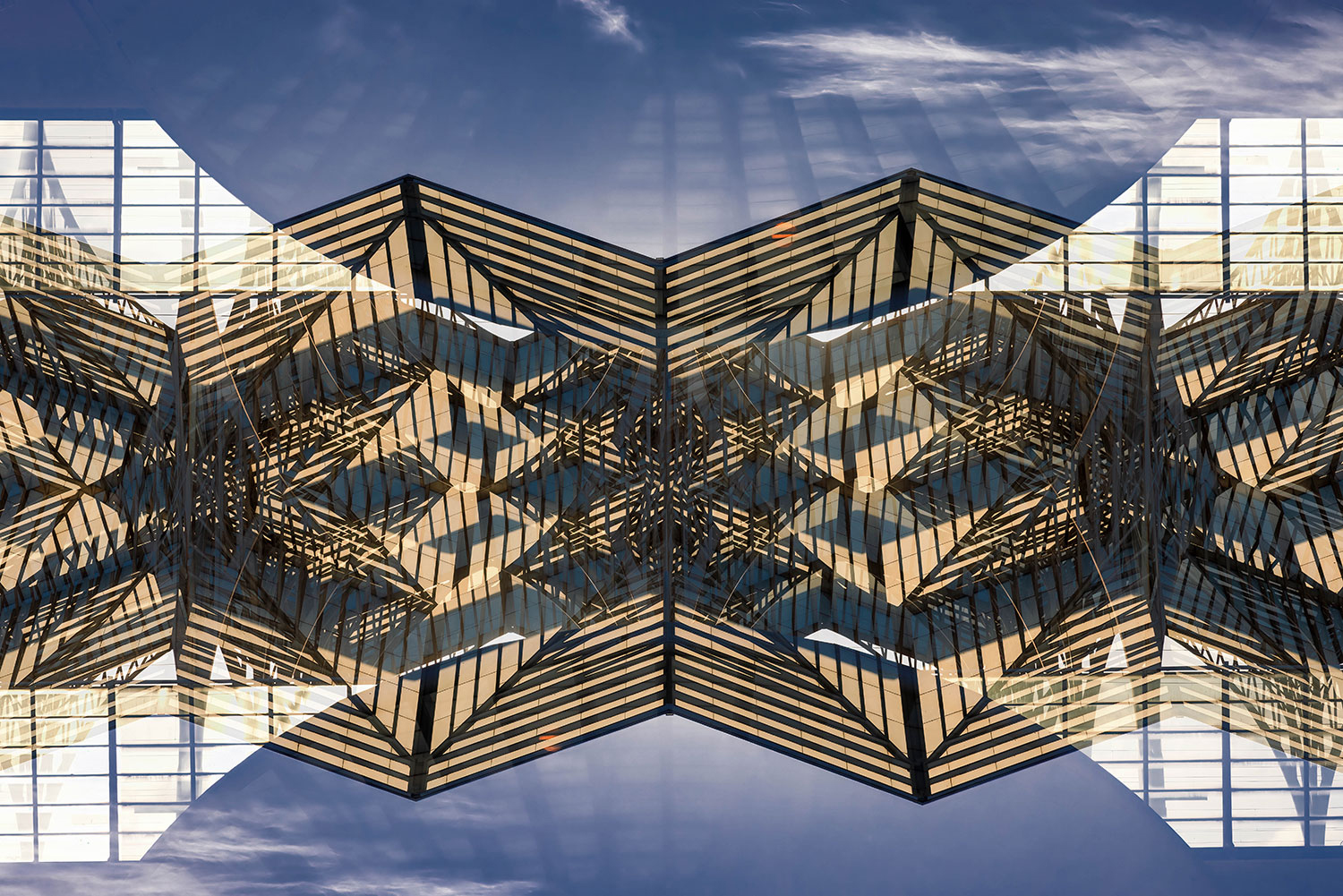
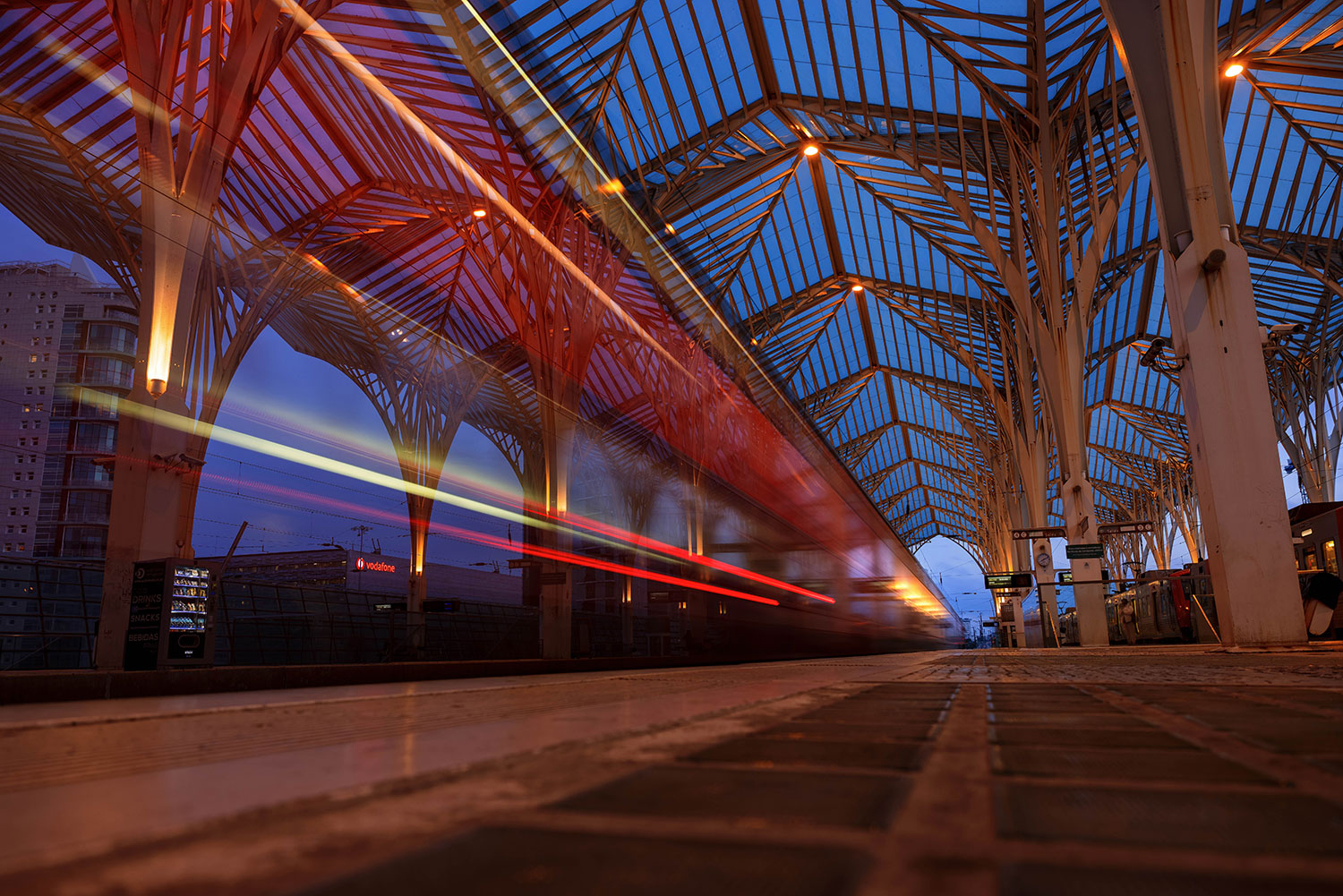
#6 Ponte Vasco da Gama – Vasco da Gama bridge
After a pleasant half an hour walk along the Tagus riverside from Estácao Oriente, you will reach the Vasco da Gama bridge. Stretching to 12 km, it is one of the longest bridges of Europe and worldwide. It was opened to traffic in 1998, and it is one of the only two Lisbon bridges that span the Tagus river.
Its modern and pure aesthetics are most impressive from Parque das Nações, where its monolithic and iconic pillars rise from the water.
As usual, with the element of water, I recommend aiming for reflections in your photography. There is a little park and the viewpoint Miradouro da Ponte Vasco da Gama which is my sunrise recommendation for Lisbon with the sun rising behind the bridge. The morning blue hour can be very beautiful here as the static bridge will be contrasting the organic sky mirrored on the river. A tripod and filters are advisable to bring.
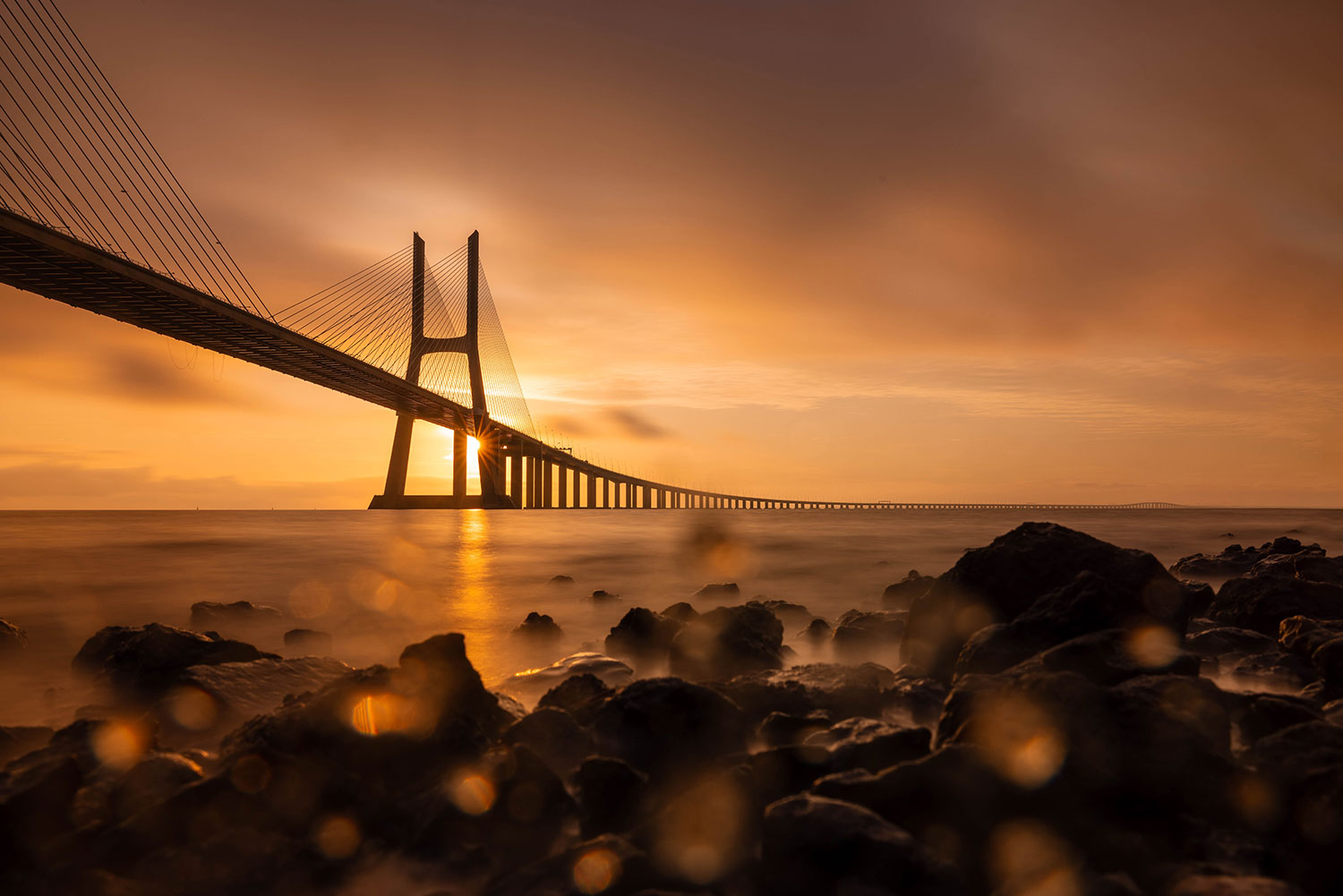
In search of a higher viewpoint to photograph the bridge, I visited Torre Vasco da Gama – the Vasco da Gama Tower a bit further downstream one night. It is Portugal’s highest building and sports a 360° viewing platform on 145 m above ground. Now, the advantage and disadvantage at the same time: it is a bar, and you will have to have some drinks to pay for the experience. I enjoyed my photo session up there while sipping on some cocktail(s). The imagery I took does not only look psychedelic because of the drinks, I can reassure you. You will have to photograph through windows and the fancy interior lights will reflect in it. After some trial and error, I found my spots where I liked the effect! Bring some dark shirt or pullover if you want to have some control and shield some of the reflections.
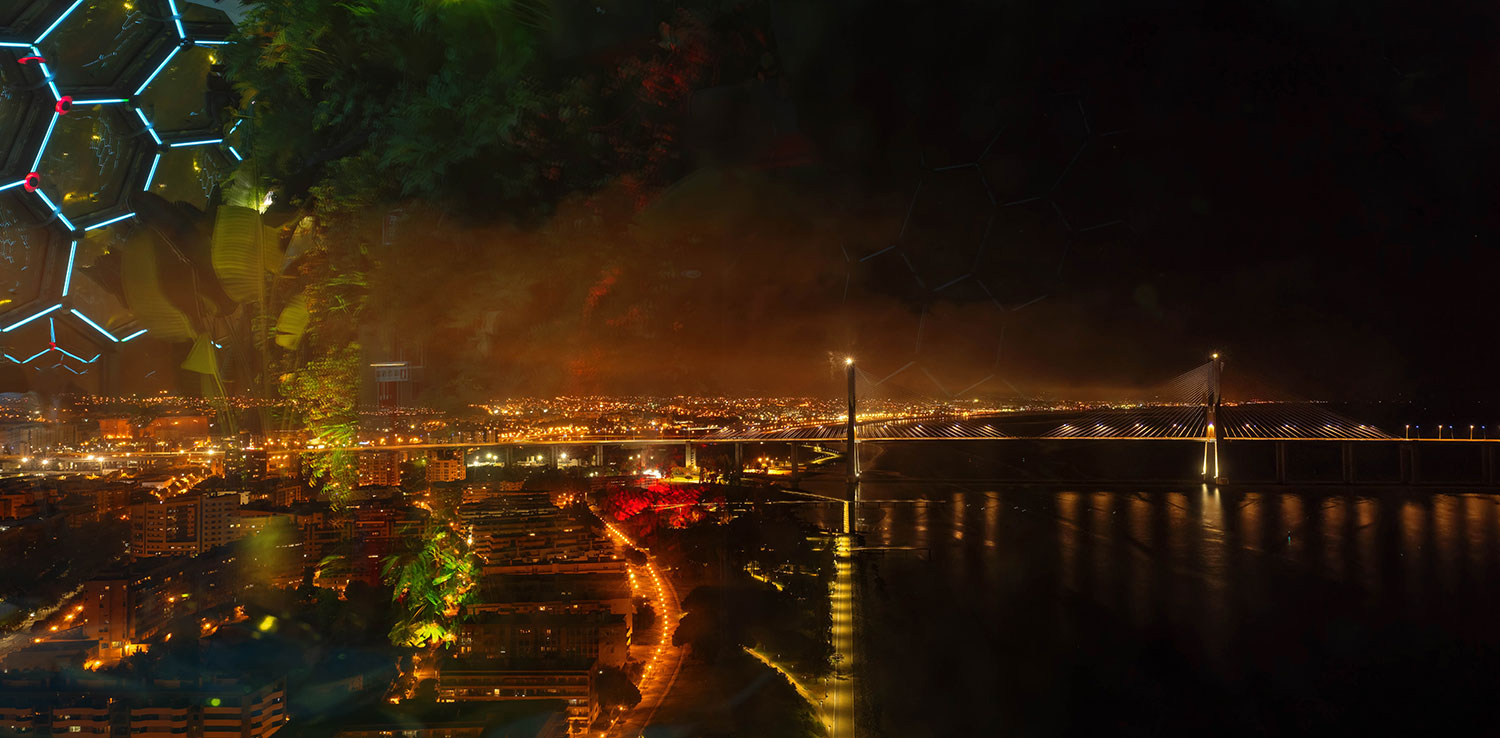
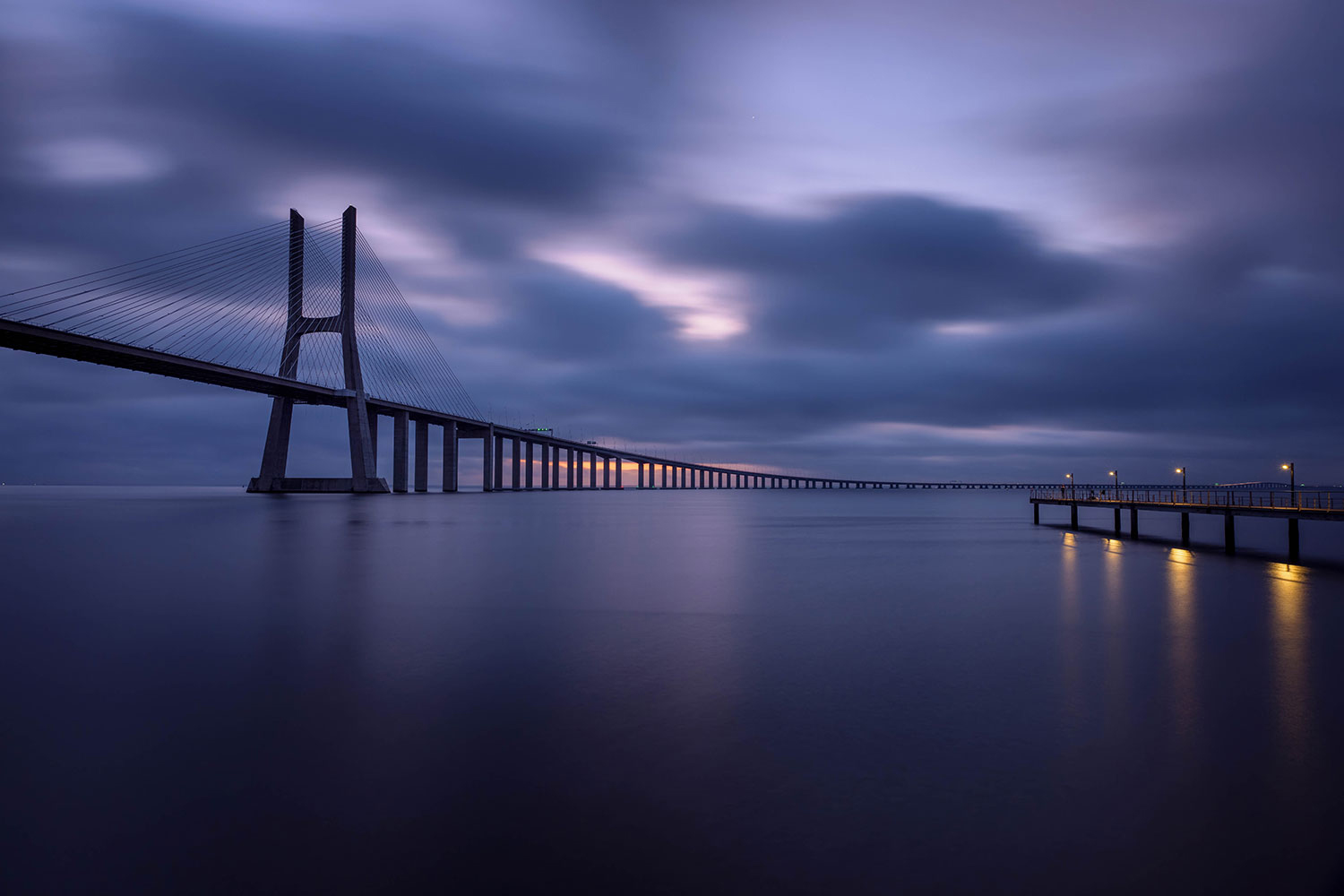
#7 Iberian Lynx
The Parque das Nações also displays some pieces of urban art. I liked the Iberian Lynx by Lisbon Artist Bordalo II most. It is a gigantic lynx peering down on us tiny human beings at its massive paws made out of rubbish and found objects.
I tried to capture the surreality of this huge pile of rubbish in the form of a majestic wild animal in the modern city surroundings, and the absurdity of its size and colourfulness.
Bordalo II is an internationally renown street artist and “artivist” creating his 3D art as a critique of our society’s wastefulness, mass production, our consumption and its effect on nature. His artwork can be found in various spots in Lisbon, Porto and other European and international cities.
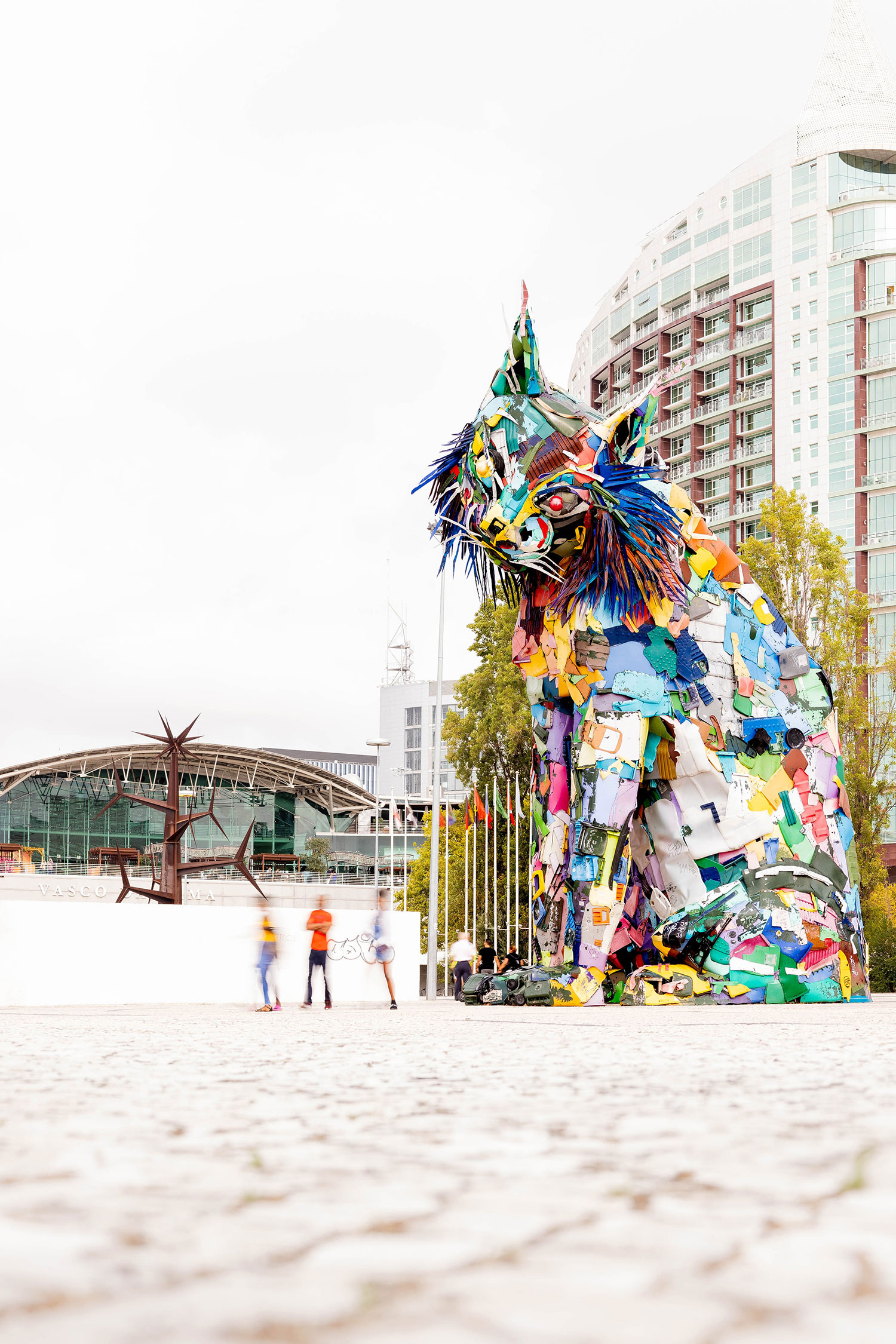
#8 Street art Graça
From huge paintings, to traditional tile painting inspired pieces, down to sticker art, Lisbon is like an open-air art gallery. You will find a lot of urban art in the streets – not only illegal, but some of it promoted and supported by municipal initiative. Embraced as an aspect of popular culture and art that is not limited exclusively to academy graduates.
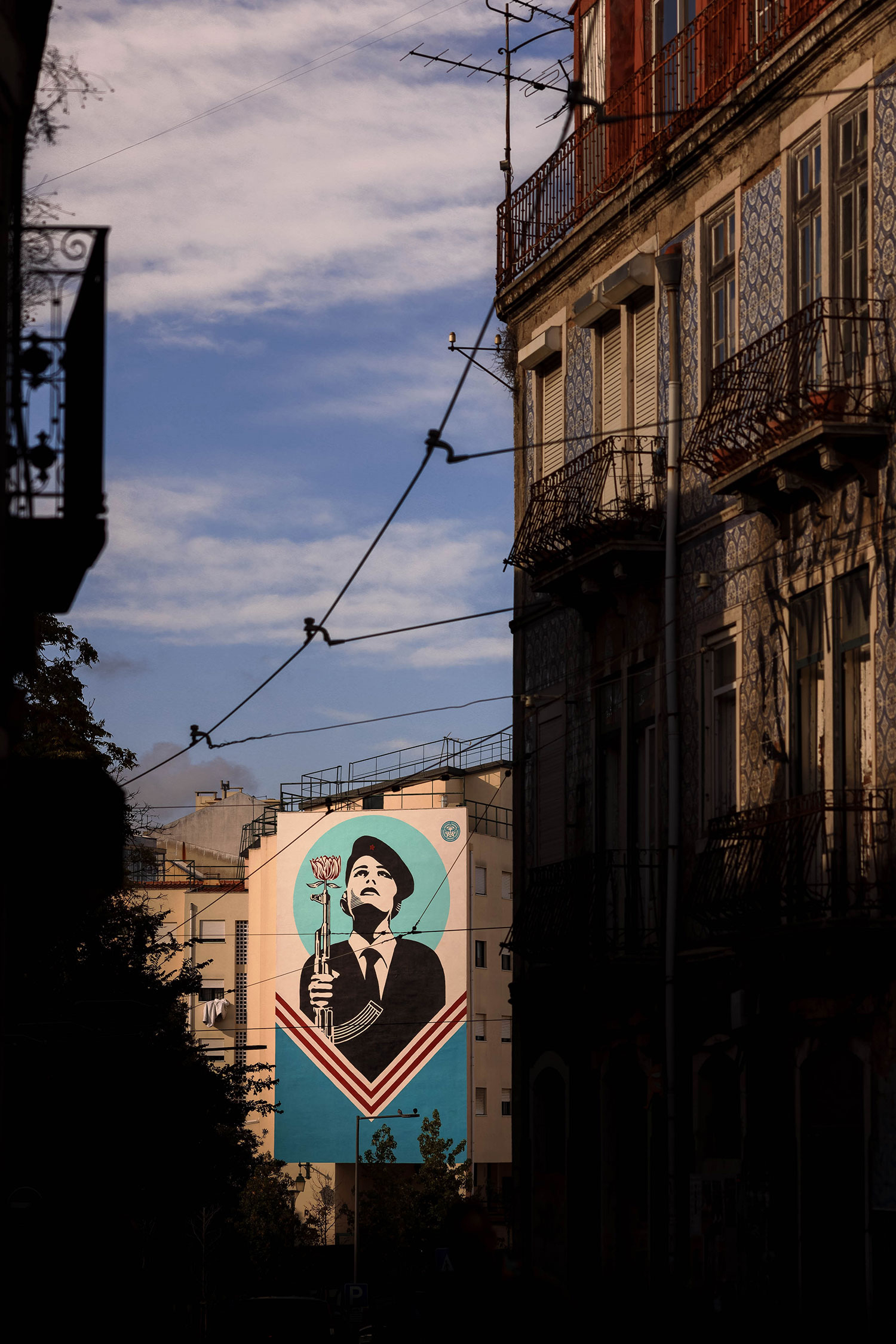
Graça is the highest neighbourhood of Lisbon, maybe making it a bit more tedious for masses of tourists to come up here. It is also a location of some captivating street artwork, absolutely worthwhile to explore with your camera.I will list two favourites here for you to start walking around and exploring more:
– Local Lisbon and internationally renown artists Vhils is carving and chiselling his artwork into facades. One of this impressive pieces that is a cooperation with American artist Shepard Fairey can be found on Rua Senhora da Glória 39.
– Another painting by Shepard Fairey (known for the famous Barack Obama “Hope” poster) is located on Rua Natália Correia 11.
If you want to dig in deeper, you might want to visit the Underdogs Gallery.
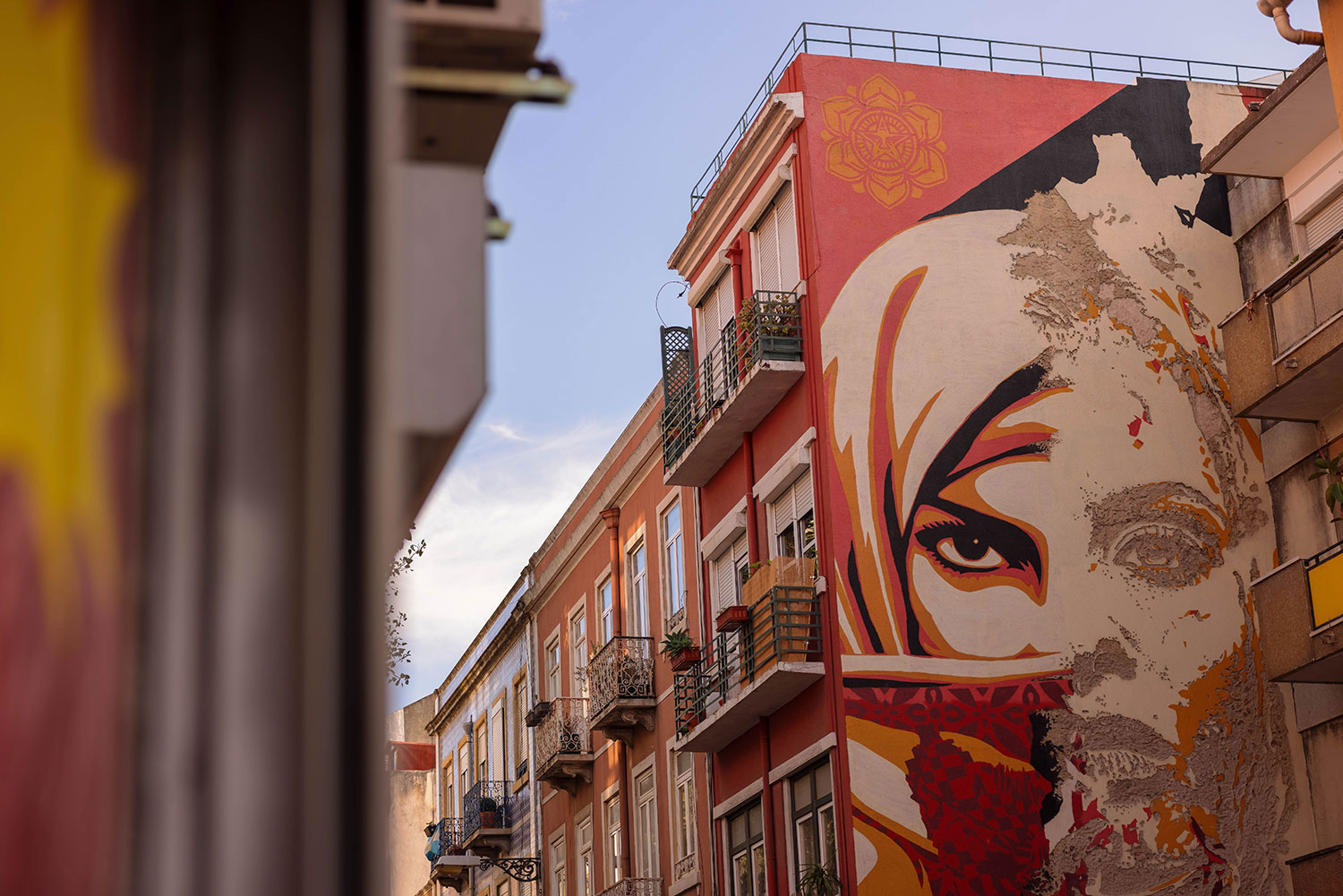
Bonus – Day Trip from Lisbon to Parque Natural de Sintra-Cascais
If you’ve Googled ‘Lisbon Photography Locations’, you’ve no doubt seen a photo of the castles within Parque Natural de Sintra-Cascais. While it’s located outside of Lisbon, this is the place to go if you love palaces and castles. While it’s not my favourite location in Lisbon, I visited several times, trying to get some pictures anyway and maybe it wasn’t meant to be. Every time I visited, I ended up in severe cloud and camera-threatening weather. And while I am well aware of how wonderful moody, misty, bad-weather photography can be, the kind of conditions I had clouded my enthusiasm and creativity unfortunately.
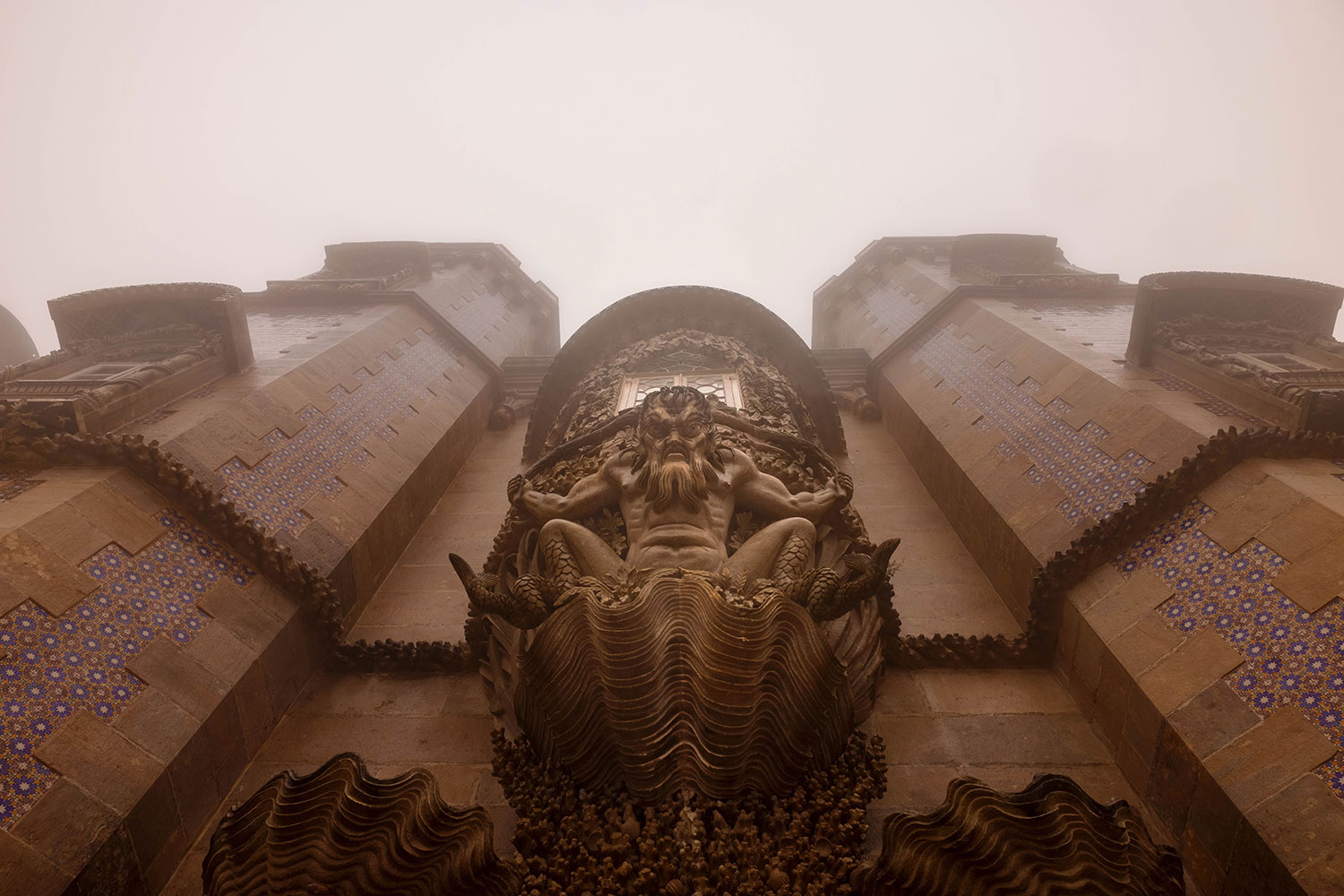
This is why I’ve added this location as a Bonus in this guide, somewhere to note for castle lovers to visit!
So, this is your turn if you’re a fan of palaces and castles! Go and get some better imagery than me!
Tips for Visiting
The Parque Natural de Sintra-Cascais is approximately 145 km2, it’s huge so it’s best to plan your visit. The official highlights in it are the Moorish Castle, Pena Palace, Quinta da Regaleira, Palace of Sintra, Monserrate Palace, the Convent of the Capuchos and maybe even some more. Those attractions are scattered around in some wonderful woods – actually the most serious woods I have seen in Portugal so far.
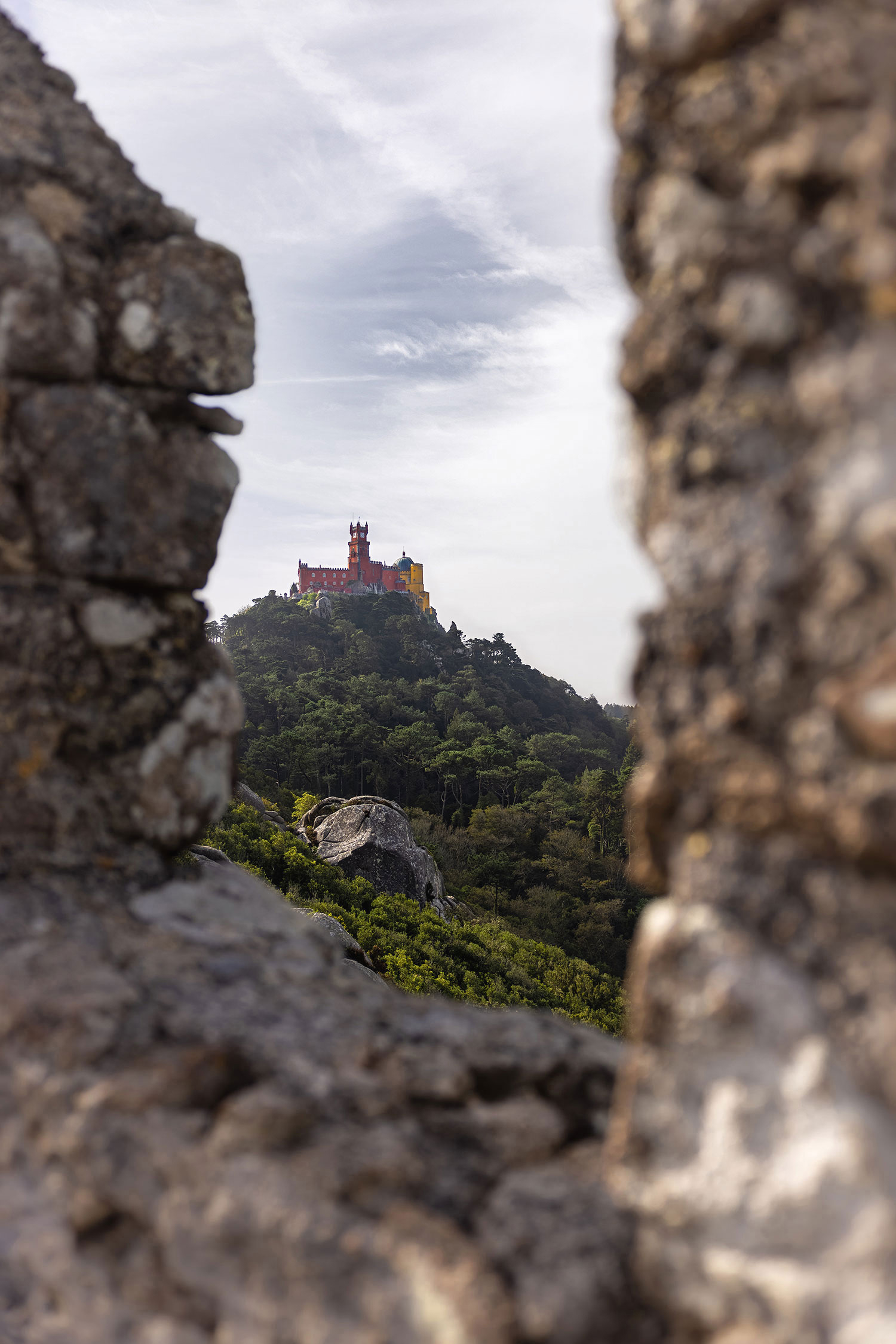
There is a lack of a car-suited infrastructure, you’ll there isn’t much parking and there are long one-way streets. This can make getting around in a car quite frustrating, so a big tip of mine, leave your back in Lisbon and use public transport, taxis, tuk-tuks or walk! There are great train connections from Lisbon and organised tours can make your trip to Parque Natural de Sintra-Cascais more efficient. And that is the reason why this location ended up in the Lisbon guide. I recommend visiting from there.
Note: Avoid visiting in main holiday season and weekends and reduce waiting time buying your tickets online. If you aren’t keen on paying a lot of expensive entrance tickets and want to avoid substantial queues: take a walk on any of the parks trails, enjoy nature and catch your sights of the attractions from outside the walls and fences. Enjoy!
Lisbon Photography Locations – Clickable Google Map
Below you’ll find a Google Map of Lisbon’s photography locations marked. Every viewpoint and location noted within this guide, is include in the map. Please click around and plan your trip!
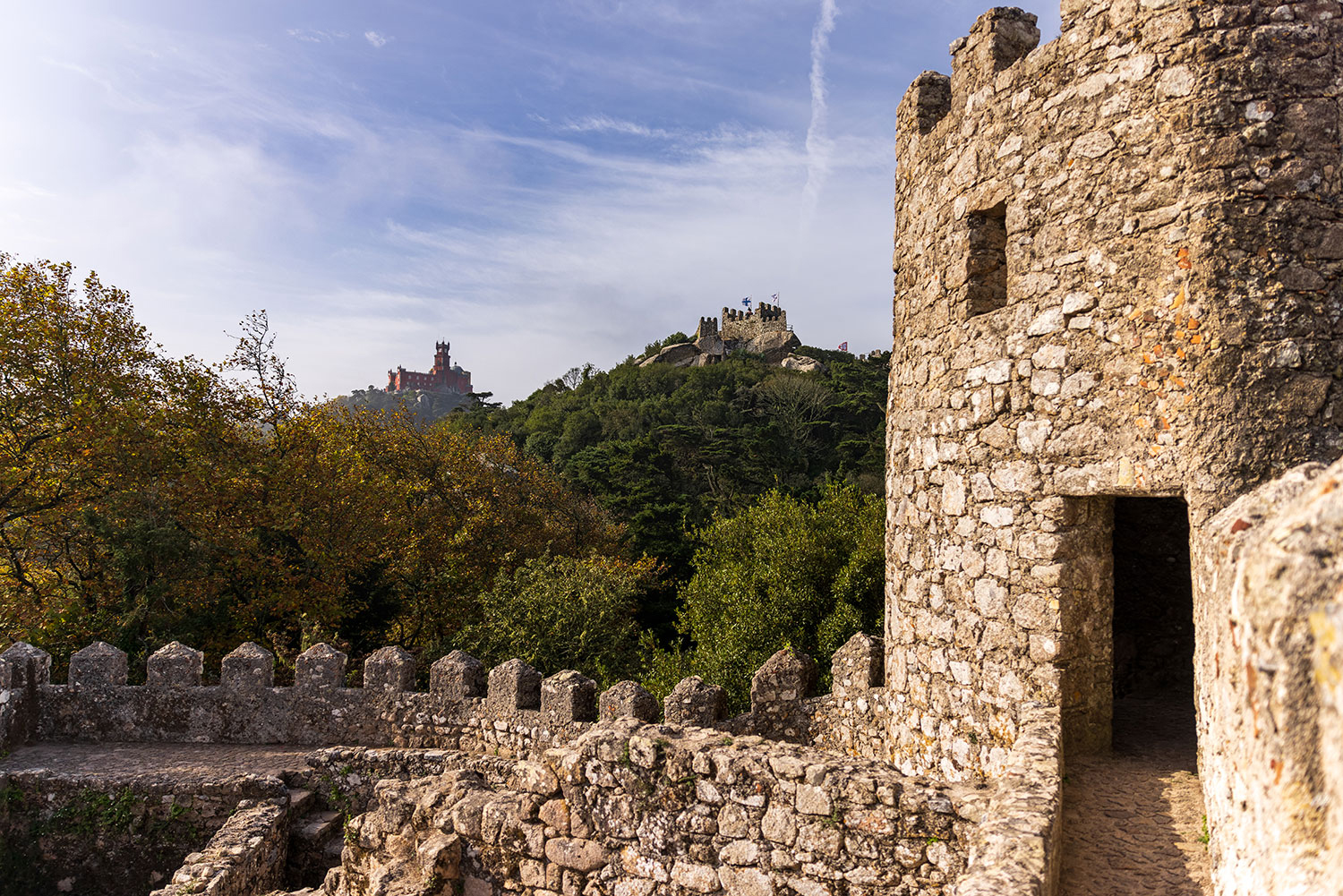
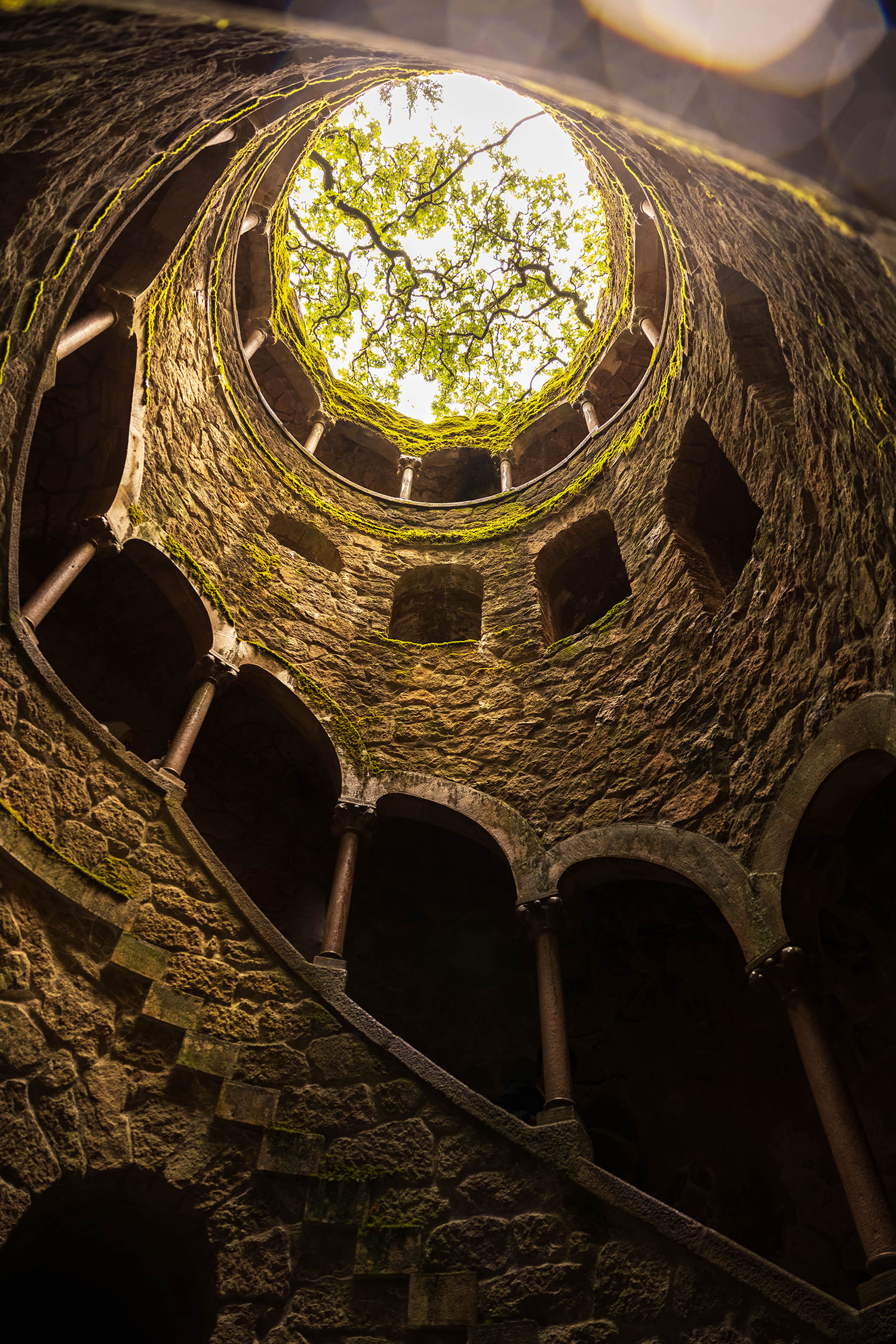
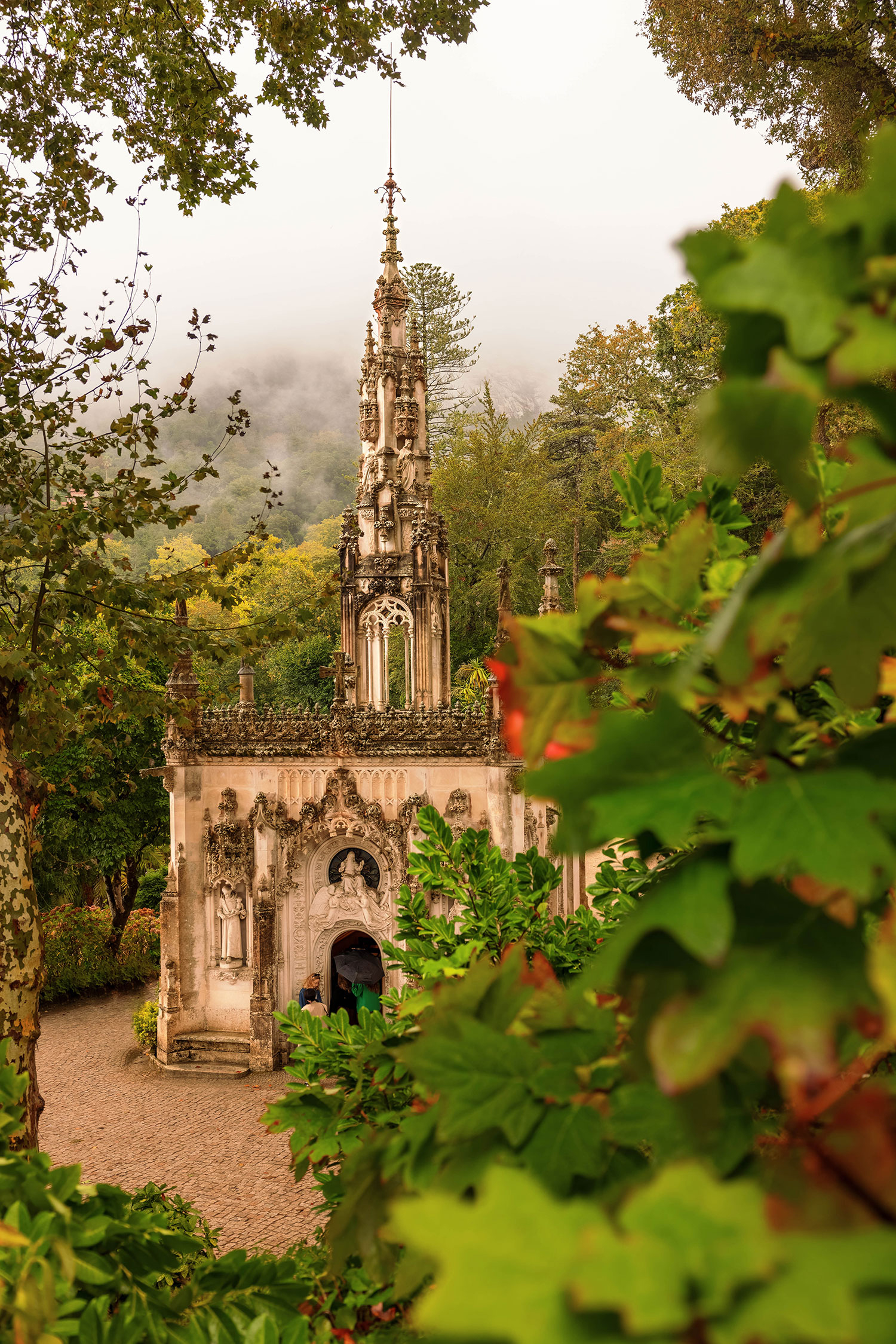
Keep exploring European destinations with The Wandering Lens here.
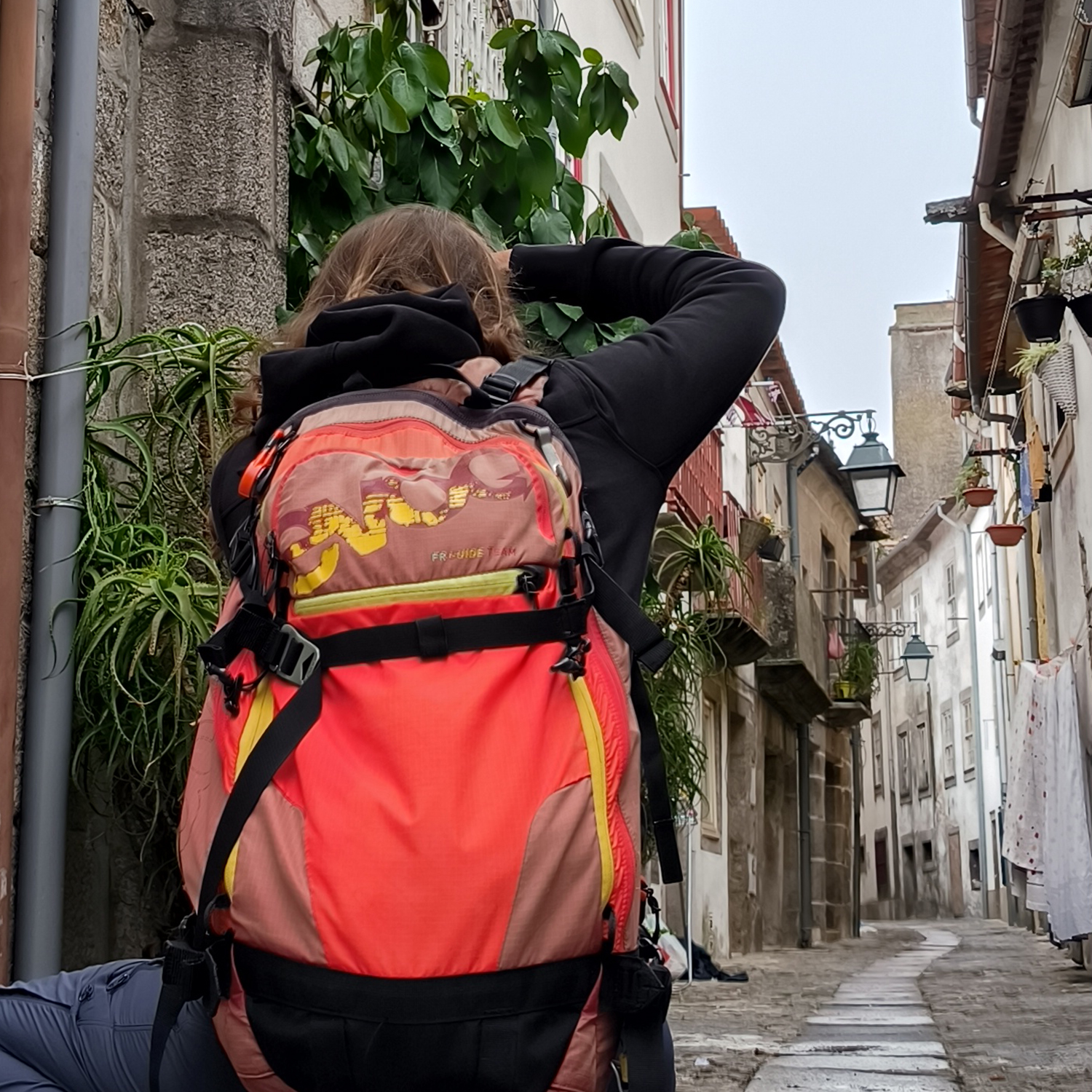
Nomad by heart and a passionate van traveller, Julie Baaske is a creative professional who found her key to creativity in diversity. When not working as a freelance car designer, she will most likely be found exploring some new places with a sketchbook or tablet, watercolour brushes or her camera. Follow the whiite rabbit and a designer on the road, via whiite.space

